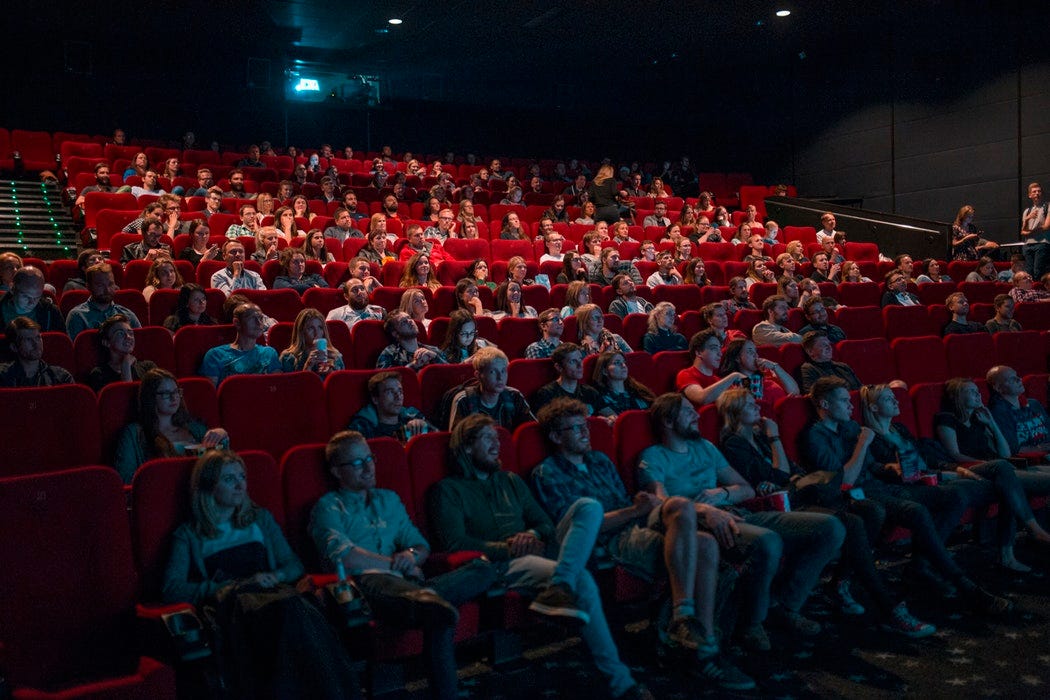Studying Film, Is It Worth It?
My experience as a first-year Film Studies (and English Literature) student.
Note; For privacy reasons, I won’t be naming my University. I’m also only going to discuss the film side of my degree, and how joint honours are in general. I will not be going in-depth about the English side today!
The thing that people ask me the most about is my experience as a Film student. What films do I study? Do I do any practical filmmaking as a part of my course? Today, I aim to, hopefully, answer most of the questions that people may have. I also hope this can enlighten others about what my first year of a film degree was like.
Credit: University of Winchester
First, I would like to address the elephant in the room; I can only comment on the first year of the degree. I hope to update this in two years when I graduate but I’m not in the position to comment on second and third year, and how the workload and the course itself may change. Secondly, my joint honours means I only take half of the degree (maybe a little more depending on the modules I have chosen and how they may outweigh my English honours); however, my core modules remain (pretty much) the same and I also took optional film modules to accompany this.
Studies or Practical or Both?
The first thing you need to figure out when applying for a Film degree is whether you want to do Film Studies or Practical Filmmaking (or a bit of both). The two are very different courses and I recommend that you try your best to get a taste of both before you decide. The best way that I can describe Film Studies is English Literature but replace books with films and replace literary devices with film form. Some Sixth Forms and Colleges in the UK offer an A-Level in Film Studies, which I would highly recommend to anybody with any kind of interest in Film as it has the option to take part in practical filmmaking as part of your coursework. However, you can get around this by submitting a screenplay instead (this is what I did).
Practical Filmmaking is very hands-on. Whilst I opted for Studies at University, I do have experience in Practical and have also had the opportunity to visit student short film sets. To get pre-university experience in Practical, multiple colleges offer practical courses. However, these are B-Tech (I believe) and not A-Level. You can also get experience in Practical with the BFI Film Academy Short Courses (this is how I got my experience). This is the route that I would recommend (if accessible to you), as it gave me the best idea of what working on a film set might look like. The BFI Film Academy allowed me to speak to industry professionals and gives graduates of the short courses access to so many other specialist courses. (You can find out more on their website here: https://www.bfi.org.uk/bfi-film-academy-opportunities-young-creatives/courses/bfi-film-academy-short-courses )
To speak on personal experience, I took Film Studies for my A-Levels and fell in love with it, whereas I realised that practical was not my thing, and that’s fine! Inevitably, this led me to choose studies for (half of) my degree. To give some personal advice, I am a firm believer in the idea that if you do what you love, you will exceed. Do what feels best for you and not for others, sometimes it’s ok to put yourself first, especially when it comes to what you’re passionate about!
What does a Film Studies degree entail?
The answer, intended for anybody who has done the A-Level (scroll down if you haven’t for some advice!), is that they’re very similar. The only major difference is that instead of being 11 (on average) films for the two-year course, it’s a new film every week. You also, arguably, don’t end up going as in-depth as you do with the chosen film. This isn’t a bad thing though as it’s easier to gain the skills to analyse and interpret films yourself, instead of following guidelines set by your teacher or the exam board. You also don’t have to focus on one set question for one film. If you struggled with topics like ideology and spectatorship for your chosen films at A-Level, you don’t have to worry about that too much here as you can either:
If the question for your end-of-module essay is broad, you don’t have to talk about topics, theories and elements of film form you’re not so confident in. You can play to your strengths.
If you do have to talk about a topic or theory you aren’t too confident in you can choose a film from a (much) longer list to the A-Level list. You aren’t just locked into the film chosen by your teacher. Even if the question is specified to a certain film under these circumstances, you have weeks to submit a final write-up so you have time to adapt, rather than sitting in a timed exam.
Credit: Owlcation
For anybody who has not done the A-Level, who may be going to a Sixth Form / College that doesn’t offer it or anyone else in general who hasn’t had the chance to study film before higher education, here’s an explanation.
But first, some advice! If you haven’t picked A-Levels yet or haven’t gone to college yet etc. I would recommend picking similar subjects so it’s easier to adapt when you go on to study film. I would, personally, recommend Media Studies, English Literature or Sociology; however, speak to your school’s career’s / next step advisor first!
What can you expect from Film Studies (specifically at University) (especially) if you’ve never done it before?
Usually, you will watch the film in full first, and make a few notes based on a first viewing. These notes won’t be very detailed and that’s okay! It’s just to get a feel for the film and to grasp its basic contextual knowledge! Some people choose to watch the film after the lecture, it doesn’t matter too much in my opinion but most people prefer to do it the first way! You’ll then be delivered a lecture on the film. Usually (at my university), these lectures discuss a major theme throughout and link it to the film at the end. This can range from an aspect of film form (for example, our lecture on All About My Mother was about colour, using the film as an example) to historical context (e.g. Umberto D. and post-war cinema contexts) to industry (e.g. Juno and American Indie Cinema). I also got one seminar a week, where we would discuss that week’s film in a small group, where we were given focus questions to think about.
At my University, for my core Film Studies module we had 10 lectures a semester on 10 different films and topics. In my first semester, the question was broad. We were sent to pick a film and analyse a specific part of film form concerning our chosen film. The second semester was slightly less broad. We were given a set of questions but could pick which films we wrote about, allowing us to play to our strengths.
My optional module worked slightly differently. It was about the directors of international cinema. Instead of focusing on just context and themes, there was an emphasis on the autuer.
What can you do with a Film Studies degree?
A lot of people are ignorant to the fact that if you play your cards right, you can do some amazing things with a degree in Film Studies, including some extremely cool jobs that I didn't even know existed until I went to Uni.
Some jobs you can do with a Film Studies degree include (but aren’t limited to):
Film Festival Programmer
Film Journalist
Film Critic
Screenwriter
Market Research
Advertising
Producer
To again, draw on personal experience; one of the main reasons I chose a Film Studies degree is because I want to either be a film journalist or critic.
Credit: Mount Royal University
It’s also responsible to point out that you don’t need a degree to get into some of these jobs, you also don’t need a practical filmmaking degree to get a job working on sets etc. That being said, I don’t think a film degree is useless at all.
Is Joint Honours For Me? How Manageable Is It?
Not to go into depth about the English degree itself because you could swap it out for any subject of your choice and this would still all make sense but I find my degree completely manageable!
Joint honours means that I do 50% of each degree, not 100% (that would be insane). I think it’s all down to personal preference. As much as I adore film, I love having a little more range in my studies. It makes me feel a little less restricted as it means I have more control over what I’m studying, especially in year 2 as there are more optional modules to pick from. This has meant that it’s very rare that I have to do a module that I don’t want to do.
However, a lot of Universities (including mine) allow for (mainly single honours) students to pick a few modules throughout their course that aren’t related to their course, allowing for some breathing room! It all depends on how your credits weigh up though, so some people might not get the chance for this!
I Ended Up Picking Another Course, How Else Can I Get Involved in Film and Meet More Film People?
There’s a very simple answer to this. Film Societies.
Go to freshers fair and find your uni’s film societies! Membership is usually very cheap! Maybe you picked film studies and want to do a bit of practical? Join a filmmaking society! Maybe you want to watch films with friends? Join the film society! If your uni doesn’t have one, you can go to the union and form your own!
Credit: University of Sunderland
Mini Conclusion
If you guys have any more questions please feel free to drop me a message on Instagram! My handle is ceryslovesfilm, I’m more than happy to answer (pretty much) anything!







